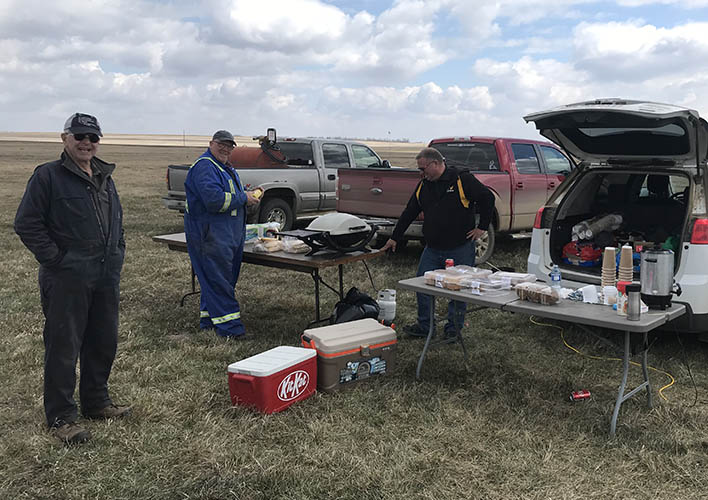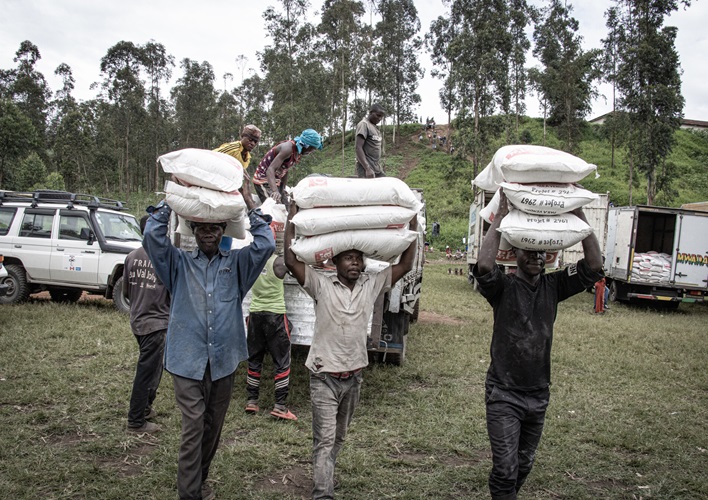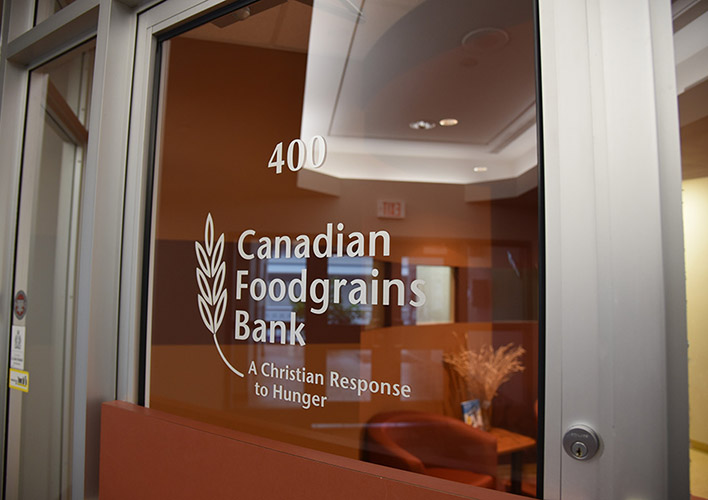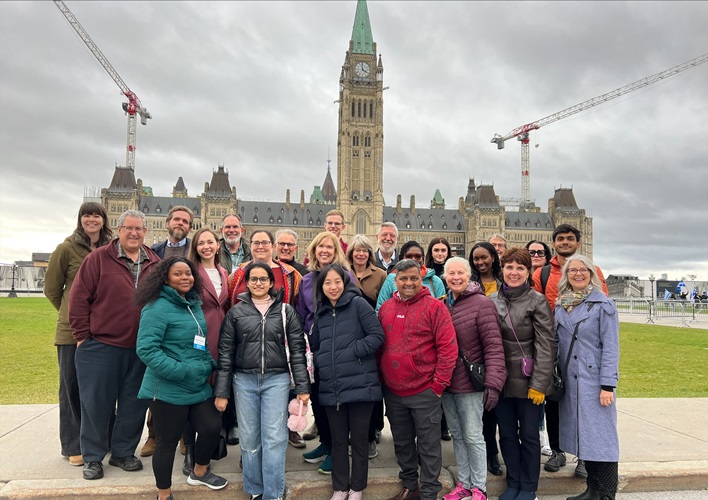Volunteers help seed the Edberg growing project’s field this year. From left to right: Terry Gabert, Darcy Goossen and Dan Schultz. (Photo: Brett Jans)
Over 200 projects to plant nearly 15,000 acres for hungry people overseas
Spring planting season is an exciting time for farmers across Canada, but it can also be a time of uncertainty.
“Weather is always unpredictable, and markets are hard to forecast,” says Manitoba regional representative Gordon Janzen. “This year is particularly uncertain now that China has stopped buying canola from Canada.”
In spite of these challenges, many rural communities have come together to plant a crop and donate the proceeds to support people experiencing hunger in developing countries. Some are even planting a crop for the first time.
The new Fiske Community growing project started out as a gift in a supporter’s will. “Werner Zacharias, who was a farmer in the area, donated the land title to the Foodgrains Bank,” says Gary Peters, chair of the Fiske Community growing project in Saskatchewan.
Peters and four others make up a core committee that provides leadership to the project. “As farmers, our work and much of our identity is tied up in producing food,” he says “So we have this special connection to food and it’s not right that people go hungry when we have enough here.”
The growing project was also an opportunity to get the Fiske community together in support of a good cause. “There’s a real willingness of people and organizations here to contribute to the project. I’ve been amazed at the farm supplies companies.” he says. The group has had various inputs and services donated by local agribusinesses.
The group planted 190 acres of wheat.
“We’re cautiously optimistic,” says Peters. “It’s been really quite dry. Farmers are concerned about moisture. We’d really appreciate a good rain.”
‘Apprehensive seeding’ for areas experiencing dry conditions
In neighbouring Manitoba, some growing projects have begun seeding despite dry conditions.
“I’d call it apprehensive seeding,” says Bob Wiens, member of the Chipin-Glenlea project in southeast Manitoba. “In this area the cereals are basically in, now people are into canola, and corn is just starting.”
“Nobody wants rain yet because people are still really going full tilt in seeding, but in about a week from now rain would be more than welcome,” he adds.
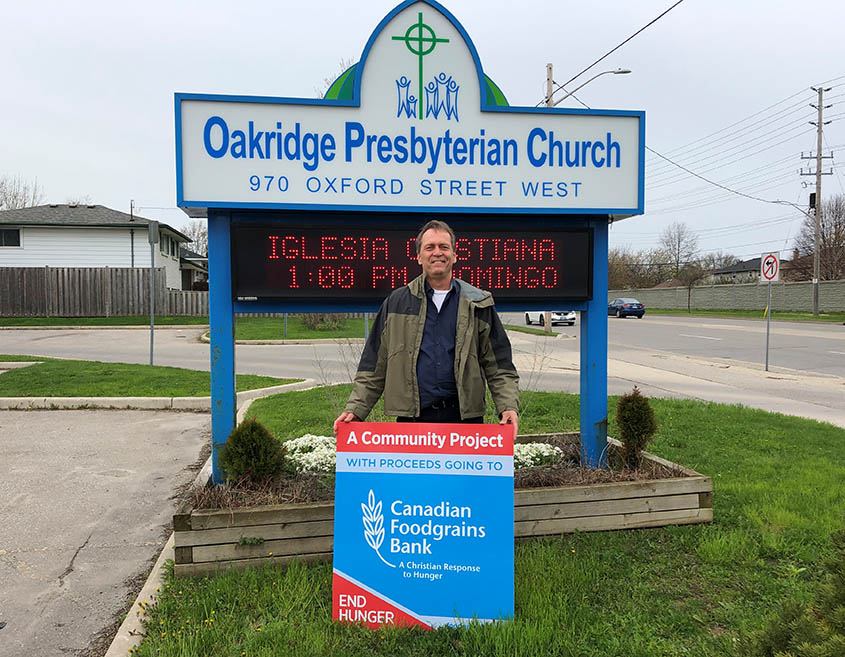
“I’ve always been impressed with the Canadian Foodgrains Bank and just feeding the world, I believe as Christians we’re called to feed the hungry and take care of the poor,” says Ed Hoekstra, who donated 10 acres of land for the Love Your Neighbour project near Tweed, Ontario. (Photo: Dave Epp)
Eastern Canada is experiencing the opposite, with high moisture levels from Ontario to the Maritimes.
“There were floods everywhere (earlier this year), it was terrible,” says Nova Scotia volunteer regional representative Ian MacHattie.
“We had a really wet April where we couldn’t do anything, but now we’ve had two weeks of no rain so we’re just waiting for it to warm up. The fields are ready, it’s all lined up and starting to look good.”
Projects in southeast Ontario are also waiting for dryer conditions. As of early June, only a few projects have seeded.
Dave Epp, regional representative for Ontario, is paying close attention to the moisture levels.
“There’s not a lot we can do, but wait and hope the weather cooperates,” he says. “One thing we can do though, is pray—both for the weather, and for the health and wellbeing of the farmers who are anxiously waiting to see what this year will bring.”
He notes that a few projects near Listowel have planted corn, and in Meaford, the Bighead River project has seeded barley and soybeans.
The Love Your Neighbour growing project near Tweed, Ontario is a new project this year and one of those projects that hasn’t seeded yet.
“We’ve had a lot of rain, and we’re hoping we can get it in as soon as possible, but it will be a bit later than usual,” says Ed Hoekstra, project chair.
Hoekstra is the pastor at Oakridge Presbyterian Church in London and has always wanted to support the Foodgrains Bank through a growing project.
“We wanted to buy farmland and get involved with the Foodgrains Bank—that was the vision,” he says. “I’ve always been impressed with the Canadian Foodgrains Bank and just feeding the world, I believe as Christians we’re called to feed the hungry and take care of the poor.”
Hoekstra and his wife Jackie bought land near Tweed, about a four-hour drive from their home in London. They found a local farmer to rent the land and who also agreed to plant and tend 10 acres of the land for the project.
Hoekstra’s London congregation supports the project from afar by raising money to cover costs of inputs. St. Andrew’s Presbyterian Church in nearby Tweed has also expressed interest in supporting the project.
“This is what we can do because of the resources we have, that can go to something greater than ourselves and how great is that?” he says. “We could have just as easily been born in developing countries, what we have is not ours, it’s a gift, and we need to use it to God’s command.”
Keeping hungry people in mind
Growing projects in central and southern Alberta have been seeding for a few weeks now, with regular conditions for the most part.
“We’ve got the normal central Alberta spring,” says Brett Jans, chair of the Edberg growing project. “We’ve had snow and sunshine off and on for the past three weeks, from beautiful warm days to everything covered in white, to everything turning green again, but that kind of seems to be the way here.”
“Guys are able to get seeding in the first week of May, that’s usually pretty good,” he adds.
Jans also notes this year is particularly uncertain for farmers in Canada, but it doesn’t stop their community from rallying together in support of ending hunger.
“For us commodity prices are not that great, but it does only affect our livelihood, not the ability for us to feed ourselves or clothe ourselves or put a roof over our head,” he says. “We’ve still got to consider ourselves lucky—we can get a line of credit, we can get access to funding, there’s so many things we can do to just survive.
That’s not the experience in other parts of the world. If they run out of something or run into problem, they actually do have nothing. I think it’s important for us to remember that.”
–Shaylyn McMahon, Communications Officer
Learn more about starting a growing project online here or by calling 1.800.665.0377 to connect with a Foodgrains Bank regional representative for your province.
